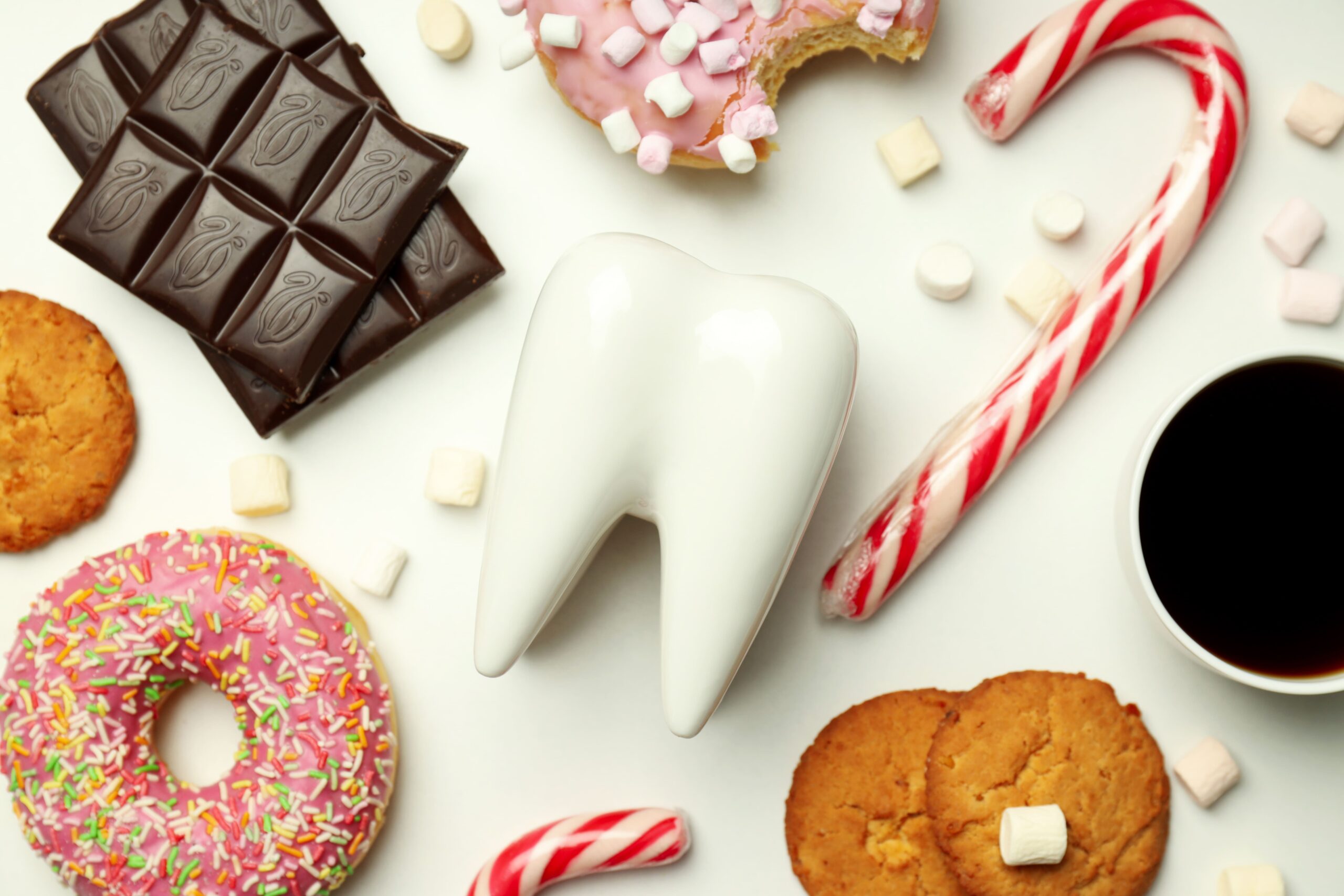
In the realm of dental care, myths are as plentiful as the varieties of toothpaste on supermarket shelves. These dental myths can cause confusion and lead to poor oral hygiene habits. Understanding the truth about these myths is essential for maintaining a healthy smile. In this Midgette Family Dentistry blog post, we’ll dispel some of the most common dental myths and illuminate the realities of oral health. We’ll delve into the truths about brushing methods, sugar’s role in causing cavities, the effects of sugar-free sodas and fruit juices, the necessity of flossing, and the implications of bleeding gums. Finally, we’ll emphasize the importance of regular dental visits to keep your oral health in top condition.
Brushing Harder Doesn’t Mean a Better Clean
The saying “no pain, no gain” couldn’t be further from the truth when it comes to brushing your teeth. Brushing harder doesn’t equate to brushing better. In fact, scrubbing your teeth with excessive force can wear down your enamel and cause gum recession, making your teeth more sensitive and increasing the risk of cavities and gum disease.
What you need is the correct technique, not brute strength. Always choose a soft-bristled toothbrush and focus on gentle, circular motions. This method is effective in removing plaque without harming your teeth or gums.
Remember, the goal is to clean your teeth, not to scrub them away. Applying too much pressure can actually be counterproductive, leading to long-term issues that require professional dental intervention.
Sugar: Cavity Culprit or Innocent Bystander?
Sugar is often though of as the sole culprit behind cavities. While sugar does play a role, the real trouble begins when bacteria in your mouth consume that sugar. These bacteria produce acid as a byproduct, which is actually what damages your teeth. Over time, repeated acid attacks can erode your enamel and lead to cavities.
So, it’s not just the sugar itself but how long it remains on your teeth and how often you’re consuming it. Snacking on sugary treats throughout the day provides a constant supply of fuel for these bacteria, leading to more acid production and a greater risk for cavities. Even so-called “healthy” snacks like dried fruits can be culprits, as they tend to adhere to your teeth, providing a prolonged feast for bacteria.
To protect your teeth, the best course of action is to minimize your exposure to sugary foods and drinks. If you indulge, try to do so during mealtimes rather than snacking all day. Additionally, brushing and flossing regularly and drinking water helps to remove the sugary residue and plaque that bacteria thrive on.
Maintaining a good oral hygiene routine and being mindful of your diet can go a long way in protecting your enamel and preventing cavities.
Diet Sodas and Fruit Juices: Tooth Dangers Hiding in Plain Sight
It’s easy to believe that sugar-free sodas and fruit juices are a safer option for your teeth because they lack sugar, but this is one of those oral care myths that require debunking. While these beverages may be devoid of sugar, they often contain high levels of acids, which can be equally damaging to your dental health.
Acids in drinks like sugar-free sodas and even seemingly healthy fruit juices can erode tooth enamel, the hard outer layer that protects your teeth. Once enamel is worn down, it can lead to increased tooth sensitivity, cavities, and other dental issues. The absence of sugar doesn’t negate the presence of these harmful acids.
When you consume these beverages, the acids can temporarily soften your enamel, making it more susceptible to wear and tear. If you’re sipping on acidic drinks throughout the day, your teeth are constantly under attack, which can speed up the erosion process.
Another aspect to consider is the pH level of these drinks. Many sugar-free sodas and fruit juices have a low pH, meaning they are highly acidic. This acidic environment in your mouth invites bacteria to thrive, contributing to dental decay and other oral health problems.
Try to limit your consumption of sugar-free sodas or fruit juices, and drink them in one sitting rather than sipping throughout the day. Using a straw can help minimize contact with your teeth. And don’t forget to rinse your mouth with water afterward to help neutralize the acids.
Keeping these factors in mind can help you make more informed choices about what you drink, ultimately safeguarding your enamel and maintaining better oral health.
Don’t Skip Flossing, Even If You Brush Regularly
Even if you’re diligent about brushing your teeth twice a day, flossing remains an essential part of your oral care routine that you shouldn’t overlook. Brushing alone can’t reach the tiny spaces between your teeth where food particles and plaque tend to hide. Over time, this trapped debris can lead to cavities and gum disease, undermining all your brushing efforts.
Think of flossing as the companion to your toothbrush. While the brush does an excellent job cleaning the surfaces of your teeth, flossing takes care of the tight spots in between. It’s a teamwork effort for a truly clean mouth. Flossing helps remove the plaque that your toothbrush can’t reach, reducing the risk of tooth decay and gum inflammation.
Incorporating flossing into your daily routine doesn’t have to be a hassle. Once you get into the habit, it becomes a quick and easy addition to your oral care regimen. There are various types of floss available, from traditional string floss to floss picks, so you can choose what works best for you.
By making flossing a daily habit, you ensure a more thorough clean and take an important step toward maintaining healthier teeth and gums. So, pick up that floss and give your mouth the comprehensive care it deserves.
Bleeding Gums Are Not Normal
If you’ve noticed that your gums bleed when you brush or floss, it’s crucial to pay attention. Bleeding gums are definitely not a sign of a healthy mouth. In fact, they can be an early indicator of gum disease, such as gingivitis, which can progress to more severe conditions like periodontitis if left untreated.
Healthy gums should be firm, pink, and resilient. When gums bleed, it’s often because plaque—a sticky film of bacteria—has accumulated along the gum line, causing inflammation. This inflammation makes your gums more prone to bleeding when they come into contact with a toothbrush or dental floss.
Ignoring bleeding gums can have serious consequences. Over time, untreated gum disease can lead to receding gums, loss of bone structure around the teeth, and eventually, tooth loss. Additionally, gum disease has been linked to other health issues, such as heart disease and diabetes, making it even more important to address the issue promptly.
If you experience bleeding gums, it’s essential to reassess your oral hygiene routine. Ensure you’re brushing and flossing correctly and consistently. Sometimes, switching to a softer toothbrush and being gentler while brushing can make a difference. However, these changes should not replace professional advice and treatment.
Scheduling a visit to Midgette Family Dentistry is crucial for diagnosing the root cause of the bleeding and receiving appropriate treatment. Your dentist can provide a thorough cleaning to remove plaque and tartar buildup and offer guidance on how to improve your oral care routine.
The Importance of Regular Dental Check-Ups
Regularly scheduled check-ups at Midgette Family Dentistry are more than just a chance to get your teeth cleaned; they’re a vital component of your overall oral health strategy. These visits allow your dentist to identify potential issues early, from cavities and gum disease to more serious conditions that might not be immediately visible. Early detection leads to less invasive treatments and often a better outcome.
Routine check-ups also enable your dentist to provide personalized advice tailored to your specific needs, ensuring you’re using the best techniques and products for your oral care. These visits to Midgette Family Dentistry are an opportunity to ask any questions you have, clear up any misconceptions, and receive professional recommendations.
Think of your dentist as your oral health partner. Regular appointments help keep your teeth and gums in peak condition, allowing you to maintain that healthy smile. Plus, professional cleanings at Midgette Family Dentistry remove plaque and tartar buildup that regular brushing and flossing might miss, reducing your risk of developing dental issues.
Don’t underestimate the value of consistent dental visits. They’re a small investment of your time for long-term benefits, helping you avoid more extensive treatments down the line and keeping your smile bright and healthy.
Our caring team at Midgette Family Dentistry is here to serve patients in the Chesapeake, VA area. Contact us today to make an appointment. Your dental health and bright smile are our priorities!
